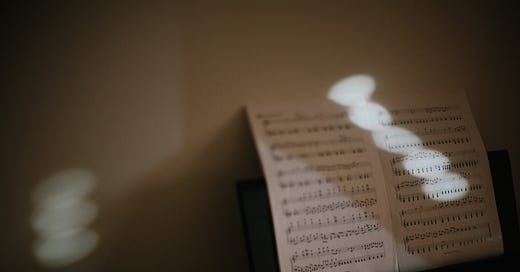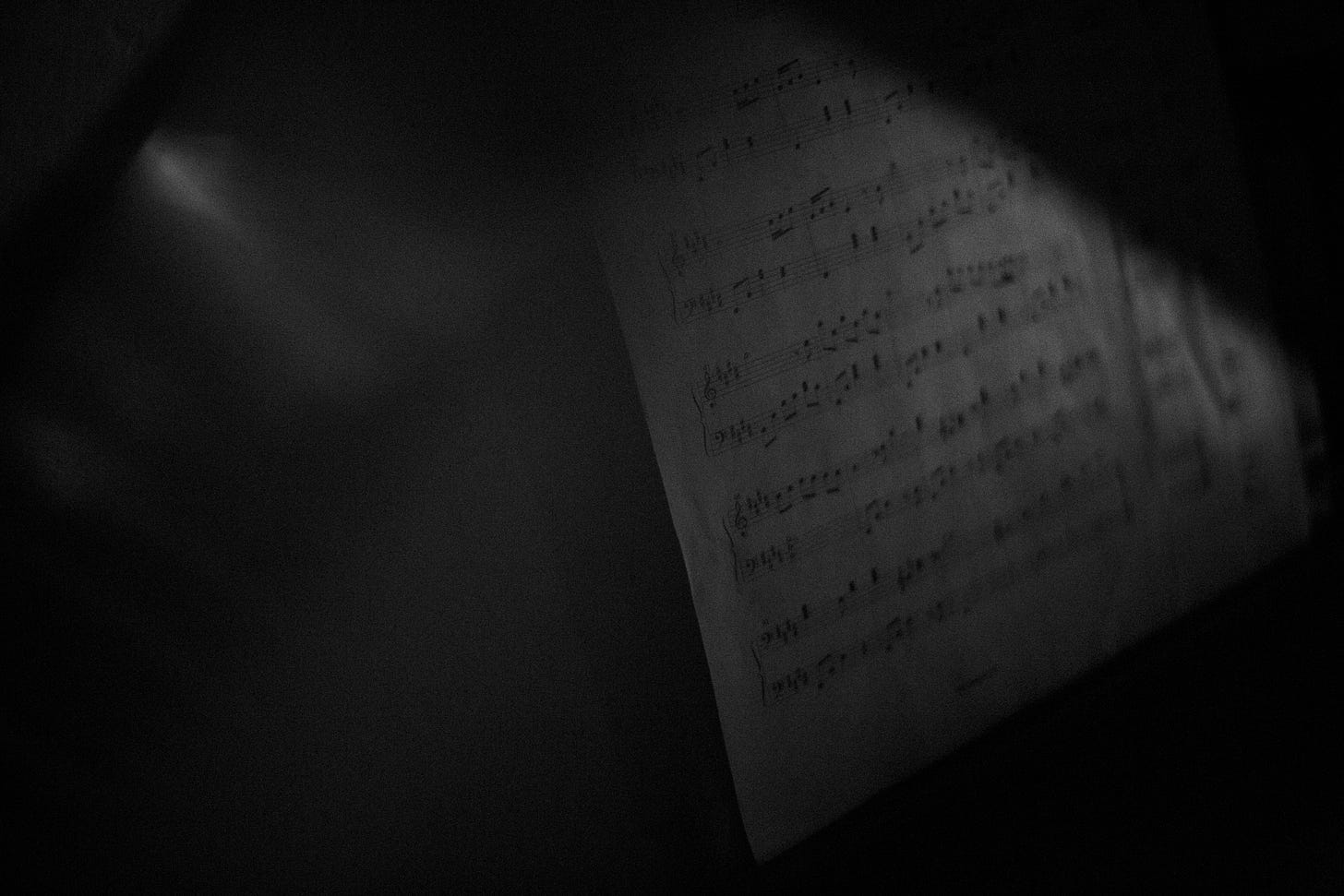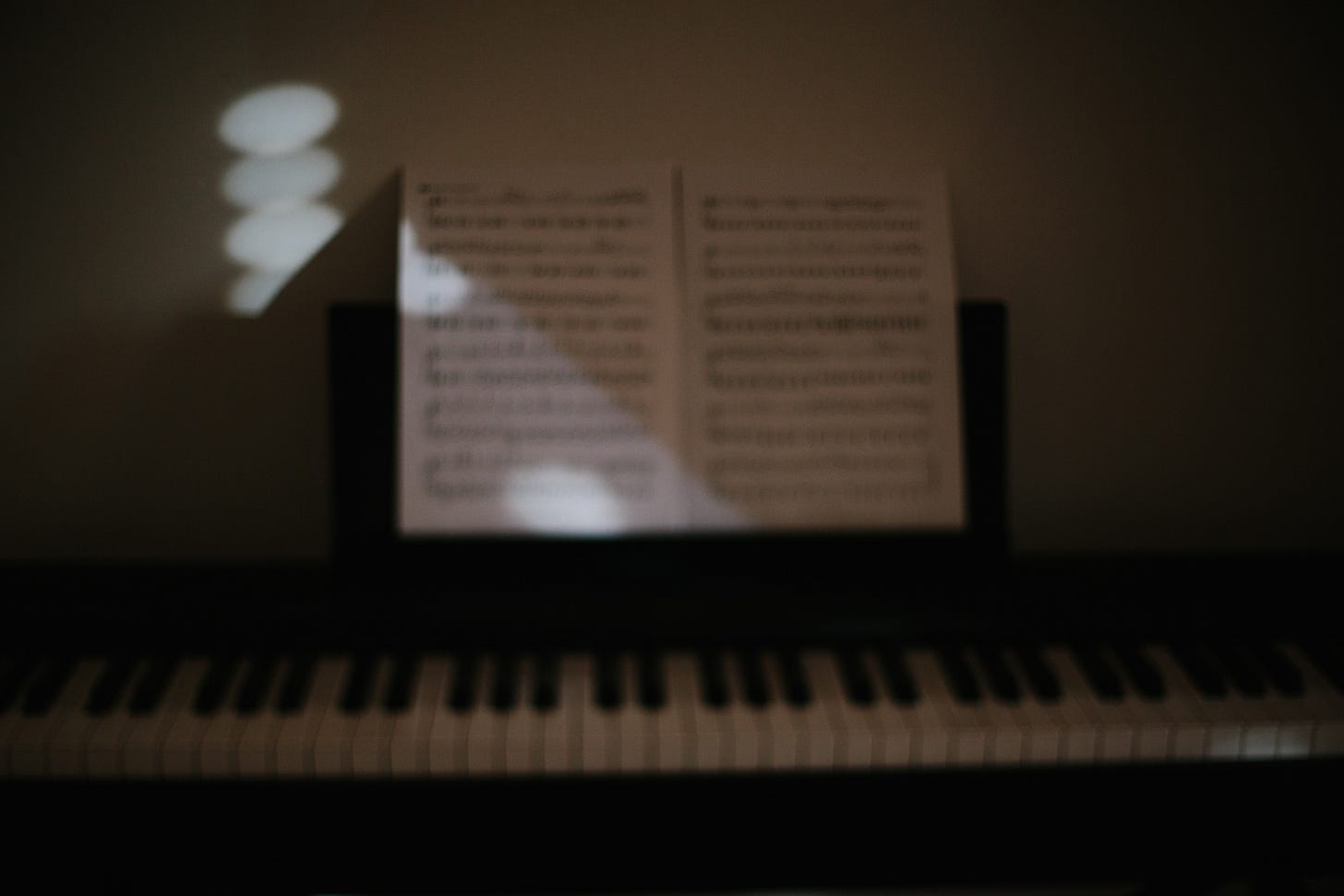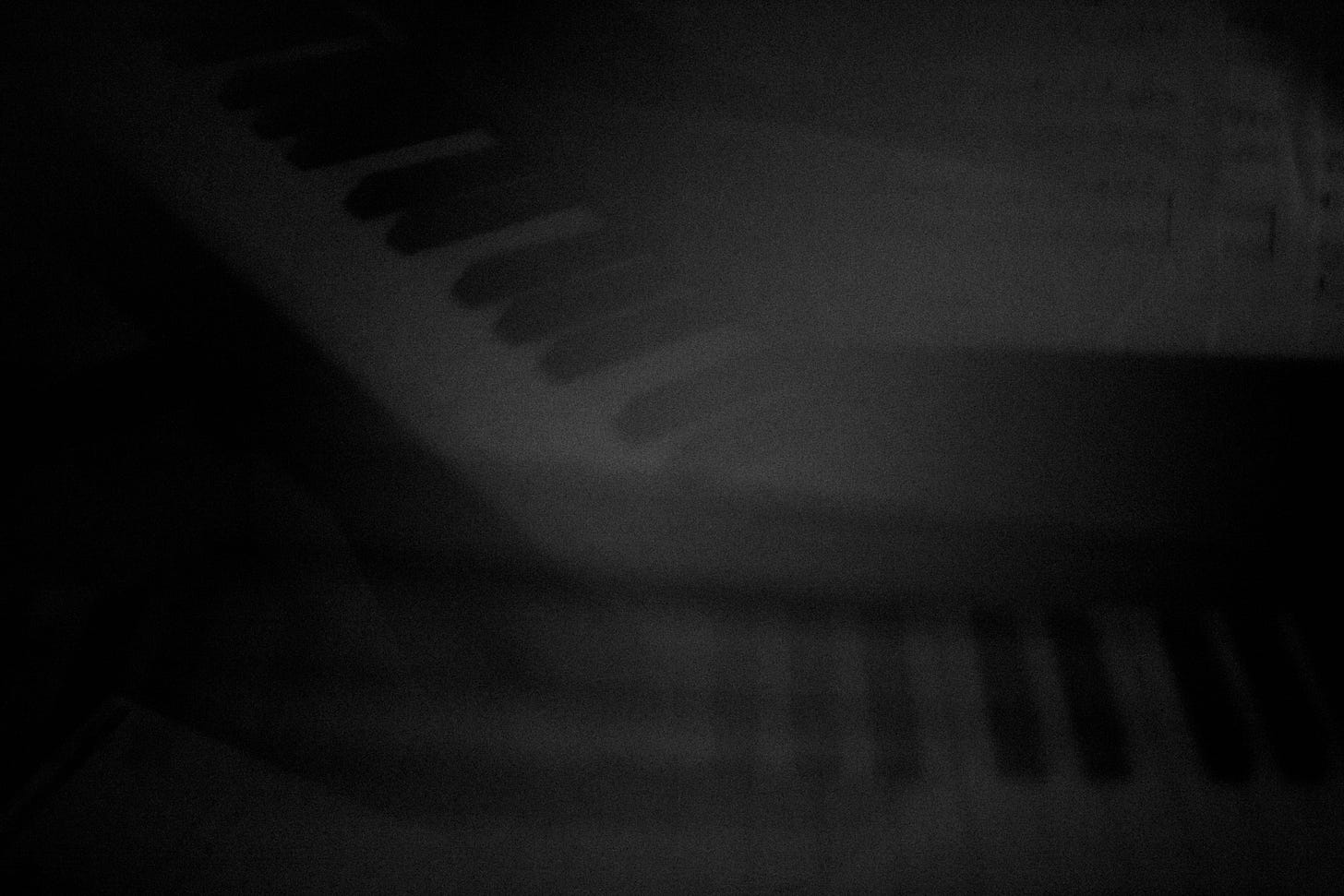This time last year, the piano wasn’t really in my life. It was, but it wasn’t - you know? It was there because I was living with it. I could see it with my eyes. But I was in that half-learning-a-piece, half-not, playing when I felt like it, way of living. And when life became tough, I was barely playing at all.
Last September, I decided to start a simple practice of playing for ten minutes a day. More than anything, to challenge myself to show up and to build up my self-trust after being in a piano limbo.
If you’ve read my last post, you’ll have seen that I was feeling pretty sceptical about it all - it was hard to believe that ten minutes a day would be that beneficial - in many ways, jumping into this was me humouring myself.
So, what has sticking to a ten-minute a day piano practice taught me?
1. The notes already exist
…I’ll reach them when I’m ready.
A truism, yes - but when you’ve lived so much of your life alongside perfectionism (alongside? Who am I kidding. Suffocated by the damn thing), the realisation that there’s no rush, that the piece you’re learning isn’t going to grow legs and run away, that your brain is more than capable - it becomes a deeper realisation than it sounds.
This rekindling with the piano has been about so much, but at its core, it’s been about self-trust. Befriending my brain.
Trusting that your brain can be there for you with your creativity, if you let it.
This piano practice feels a bit different from my photography work and my writing - there isn’t a blank piece of paper or an empty frame, waiting for me to fill it. I choose a piece, and I go about learning it. These pieces I’m learning, they already exist. I might not be able to choose how fast I’ll arrive, but I can choose that I’ll arrive.
One night, I was lying wide awake, unable to sleep, and I found myself ‘playing’ a piece with my hands on the sheets - that week I’d been learning the opening credits from the TV series Severance (what a tune). I suddenly realised I’d figured out the timing of a part I’d been struggling with. I jumped out of bed to see - and yes, my brain had figured it out, while I’d been lying there, seemingly doing nothing.
My hands and my brain, finding their way. Even in the dark.
2. Creative Gratitude practice
There have been so many moments where I’ve thought to myself, ‘Thank god this person wrote this piece’, or ‘Thank goodness this person created a video on YouTube to help me learn how to play this…’
There have been many “Thank yous” said in my mind, and to the people themselves. If a certain person hadn’t woken up one day and pushed through their own resistance in order to create a beautiful piano piece, that piece wouldn’t have been part of me pushing through my own resistance in having a daily creative practice.
Thank goodness someone trusted themselves to create a piece of music, and here I am trusting myself enough to learn it.
How grateful I am to learn the work of others, while I learn the expression of myself.
To me, music has always felt like the ultimate art, and I hope my amazement at how people can come up with a piece of music never leaves me. High on music gratitude - I think it’s a state I’ve been in since an early age, but now it’s become a place I actively visit: How did they come up with that?! This is hard enough to learn, but how did they compose it?! That whole thing entered their brain, and they wrote it down. Jeez.
This gratitude I experience every time I play is probably the perfect distraction from my inner critic. Over 30 weeks on, and not once have I been hard on myself while playing. It’s a miracle. Or maybe it’s gratitude.
3. Folding your passions away
I feel lucky - the thing I love can’t be hidden. I can’t pack the piano away in a bag, and find that I’ve slipped up on my practice a week later. Sure, there are lots of reasons why I’ve been sticking to this daily practice as long as I have, but the fact that I can’t fold the piano away is pretty damn helpful - it’s a key factor in this routine still existing.
I think about the other creative practices I would love to nurture, and I realise none of them have that place of permanence. I adore writing as much as playing the piano, but I can fold writing away. Writing is everywhere I could ever want it to be: on my phone, in the Notes app, on my laptop, in a notebook, in that other notebook. In my head.
Writing is so transportable, and perhaps I should feel thankful that I can write anywhere I like. When the inspiration strikes, I can be ready. And maybe the immovability of the piano could be seen as a limitation, compared to something like writing… But I think that limit is one reason why my piano practice is blossoming the way it is: one place, one piano. There’s a clear beginning and end.
Perhaps we can fold away many of our hobbies, but we can’t fold ourselves away. We can’t fold away our passion. Not really. I am the physical structure as much as the piano is. The words inside me waiting to be written are already there, as much as the notes on the pieces I’m learning are already there, it just doesn’t feel as obvious sometimes.
I’m ready to have a daily writing practice, and I wonder if some of these takeaways from my piano routine could help it stick - maybe I need a space that feels a bit more solid, more of a home, like the piano does.
4. Sustaining the support system
In my previous post, Dusting The Keys, I mentioned how the piano has finally become the rock it always deserved to be. This has been one of the biggest shifts for me - I was so used to the piano being one of the things to fall when life got tough. It happens to all of us - the thing that will breathe life into us ends up getting extinguished by life itself.
I could wait for things in my life to feel more in order before sitting for ten whole minutes at the piano. Or I could sit at the piano for ten minutes because it helps things to feel in order. Lord knows the same ten minutes have been spent scrolling on my phone - multiple ten minutes, many a scroll.
Life isn’t a support system for art. It’s the other way around.
- Stephen King, On Writing
I realised I’d convinced myself that whenever life was stressful, I wouldn’t be able to concentrate enough to play. It felt like too much of a task to take on. But allowing myself to play the piano for the bare minimum of ten minutes releases me from this - once ten minutes have passed, I can walk away. And even though I’ve been learning plenty of pieces since September of last year, when I started this, I haven’t given myself any solid goals - other than to sit at the piano for ten minutes a day and see what happens.
It’s rare that I stand up once ten minutes have passed. It’s also rare that I’m frozen on the keys - there’s so much involved in playing that any daily stressors can’t get a look in. The notes seem to form a wall around me, the gratitude quietens my inner critic, and I play.
Thanks for reading - your support is really appreciated!
If you haven’t read it yet, you can read my previous post here:
Feel free to say hi in the comments - it’s always nice to see who I’m speaking to 😌










